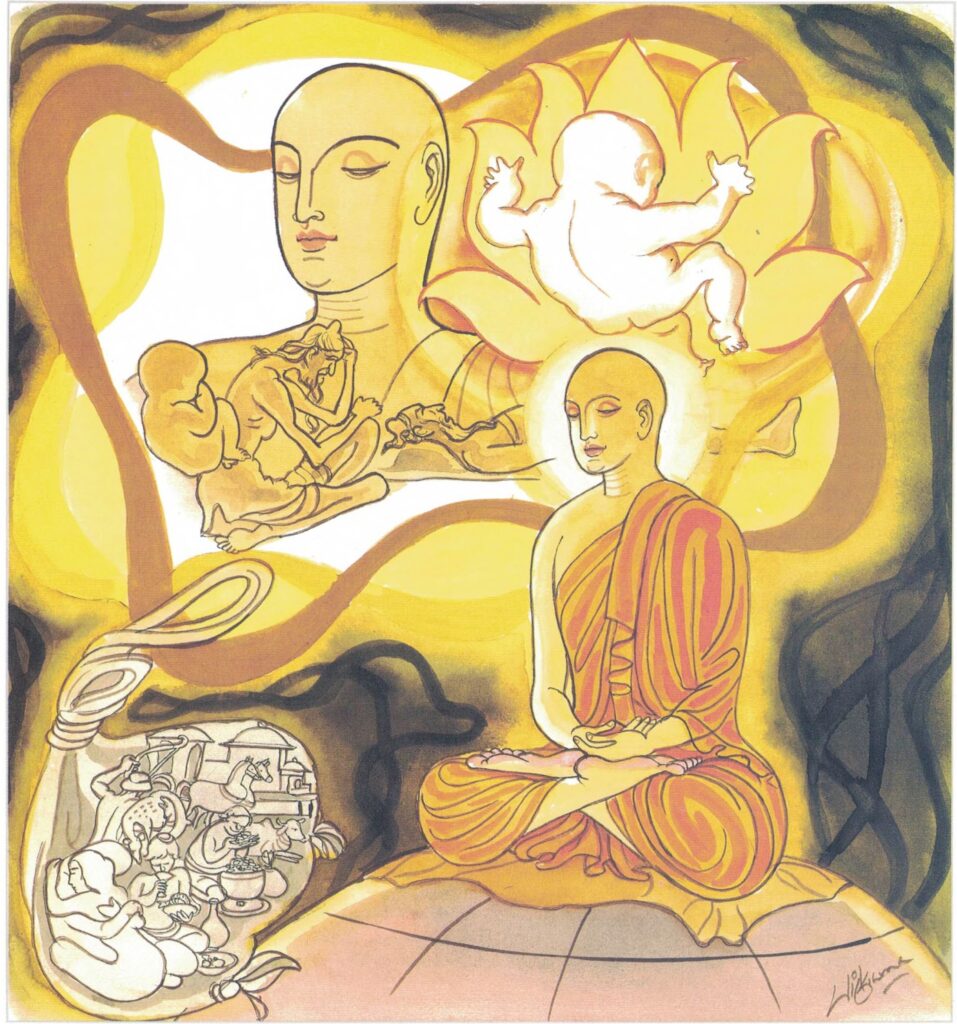Pali text, illustration and English translation of Dhammapada verse 402:
yo dukkhassa pajānāti idh’eva khayamattano |
pannabhāraṃ visaṃyuttaṃ tamahaṃ brūmi brāhmaṇaṃ || 402 ||
402. Whoso in this world comes to know cessation of all sorrow, laid down the burden, freed from bonds, that one I call a Brahmin True.

The Story of a Slave who Laid Down His Burden
The story goes that at a time previous to the promulgation of the precept forbidding the admission of runaway slaves to the Sangha, a certain slave of this Brāhman ran away, was admitted to the Sangha, and attained arahatship. The brāhman searched everywhere, but failed to find his slave. One day, as the former slave was entering the city with the Buddha, the brāhman saw him in the gateway, and took firm hold of his robe. The Buddha turned around and asked, “What do you mean by this, brāhman?” “This is my slave, Sir Gotama.” “His burden has fallen from him, Brāhman.” When the Buddha said, “His burden has fallen from him,” the Brāhman understood at once that his meaning was, “He is an arahat.” Therefore, he addressed the Buddha again, saying, “Is that so, Sir Gotama?” “Yes, Brāhman,” replied the Buddha, “his burden has fallen from him.”
Explanatory Translation (Verse 402)
yo idha eva attano dukkhassa khayam pajānāti
pannabhāraṃ visaṃyuttaṃ taṃ ahaṃ brāhmaṇaṃ brūmi
yo: if some one; idha eva: in this life itself; attano [attana]: one’s; dukkhassa khayam: the end of suffering; pajānāti: knows fully; pannabhāraṃ [pannabhāra]: unburdened; visaṃyuttaṃ [visaṃyutta]: (and is) freed from defilements; taṃ: that person; ahaṃ: I; brāhmaṇaṃ [brāhmaṇa]: a true brāhmaṇa brūmi: declare
He has become aware, in this world itself, the ending of suffering. He is unburdened: he has put down the load. He has got disengaged from the bonds that held him. I call that kind of person a true brahmaṇa.
Commentary and exegetical material (Verse 402)
This verse refers to an instance of Buddha extending His assistance to a run-away slave who later became an arahat. The Buddha had provided support to several slaves both men and women, who, through his Enlightened guidance, reached Nibbāna. One of them is Puṇṇa. Puṇṇa was a servant girl employed in the house of a millionaire of Rājagaha. One night after pounding paddy, she got out into the yard, and saw several monks out at night. Next morning, she prepared a rice cake, baked it, and took it with her to eat on her way to the well.
That day the Buddha, on His round for alms, came to the same road, and saw Puṇṇa with a pot in her hand. She offered the Buddha her rice cake which the Buddha readily accepted. She was wondering whether the Buddha would throw it away and take His meal in a palace or a millionaire’s house. But the Buddha sat there itself by the roadside on a mat laid by the Venerable Ānanda, and partook of the rice cake for His breakfast.
The Buddha explained to her that the monks were awake at night on their religious duties, and preached to her the doctrine. At the end of the preaching, Puṇṇa realized the fruit of sotāpatti.
Another servant who became an arahat through Buddha’s guidance was Rajjumālā, who was employed in a house in the village of Gayā, where she was subject to constant harassing and humiliation by her mistress. The mistress used to pull her by her hair and beat her. In order to escape such beating, she shaved off her hair, but the mistress tied a rope round her head and pulled her about. She came to be called Rajjumālā (one who has a rope as a garland) as she had a rope round her head.
Being fed up with this life under her mistress, Rajjumālā left the house as if she were going to bring water, but went to the forest and tried to hang herself. However, the Buddha, who saw her potentiality to realize the fruit of sotāpatti, arrived at the spot, and preached to her. She realized the fruit of sotāpatti, and went home, where she related the story of her meeting the Buddha.
The mistress, with her father-in-law, came and met the Buddha, and conducted Him to their house, and offered alms. The Buddha preached to them and said how Rajjumālā in a previous birth used to ill-treat her present mistress of the house. Rajjumālā was freed and adopted as a daughter by the father-in-law of her mistress. After her death, she was born in the Tāvatiṃsa heaven.